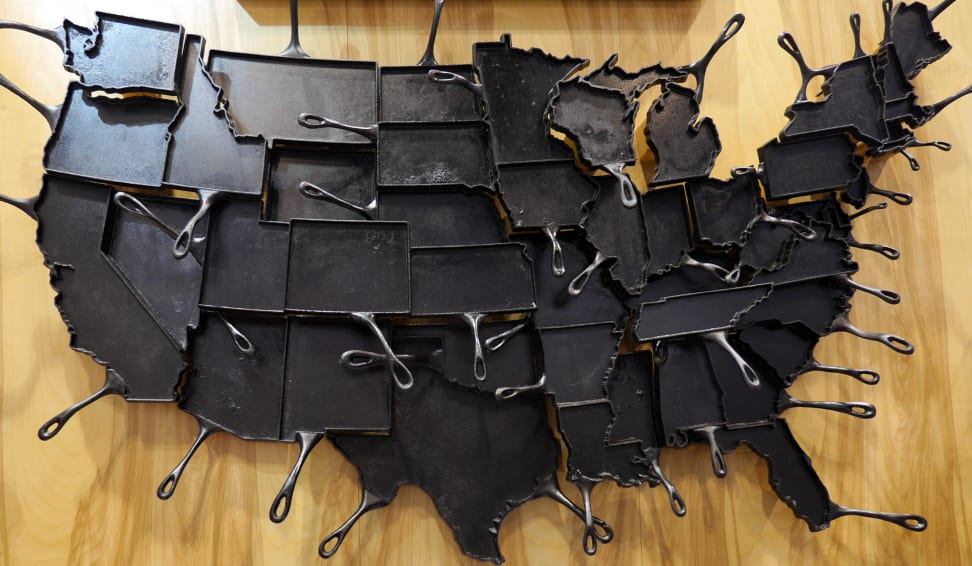 Credit:
Jeremy Stamas / Reviewed.com
Credit:
Jeremy Stamas / Reviewed.com
Products are chosen independently by our editors. Purchases made through our links may earn us a commission.
From campaign promises about factory jobs to recent rumblings about a border adjustment tax, American manufacturing has been thrust to the forefront of political debate.
Big ticket items—cars, airplanes, air conditioners—might get the most attention. But for most Americans, the issue of trade hits closest to home in the kitchen, where the vast majority of gadgets and cookware are imported from overseas.
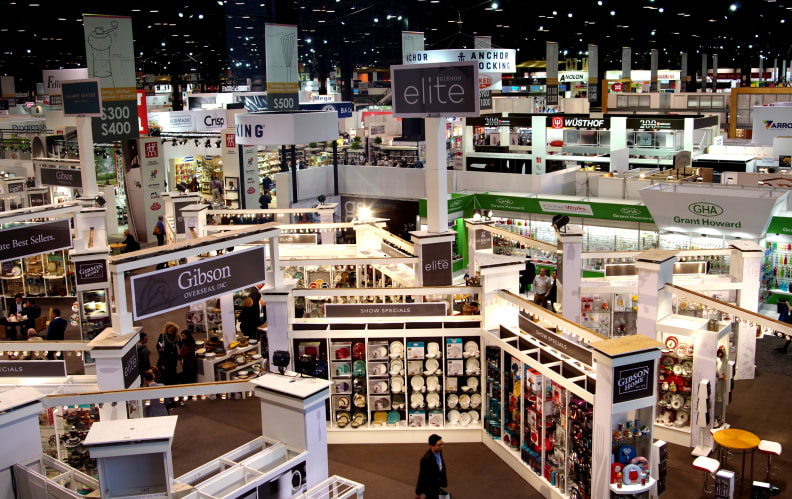
Exhibitors pack the 2017 International Home and Housewares Show in Chicago, IL.
According to the International Housewares Association (IHA), a 1600-member organization that represents the $346.9 billion industry, 88 percent of IHA-members’ products are made outside of the U.S., and 65 percent of those products wear a “Made in China” label.
“As an industry, we’ve been globalized for a generation and a half,” said Perry Reynolds. He’s been the Vice President for Trade Development for the IHA for two decades, and has witnessed sea changes from the beginnings of offshoring to the resurgence of a “buy American” movement.
We spoke at the International Home and Housewares Show in Chicago. The five-day trade fair is IHA’s signature event, and attracts more than 60,000 visitors from all over the world—mostly manufacturers showing off their wares and buyers deciding what to put on shelves—to the massive McCormick Place convention center.
Reynolds didn’t want to speculate as to what changes the Trump administration might make to U.S. trade policy—it’s too early, he told me. But it quickly became clear that the industry is preparing for a shift. “I suspect something’s going to change,” he said.
We discussed the vagaries of shipping costs, issues with warehousing, and the effects of the administration’s proposals on currency values. But when I asked how the housewares industry might have to to adapt to new political realities, Reynolds paused. “It’s not a clear-cut issue,” he said, choosing his words carefully. “It appears to be more simple from a distance than it does up close.”
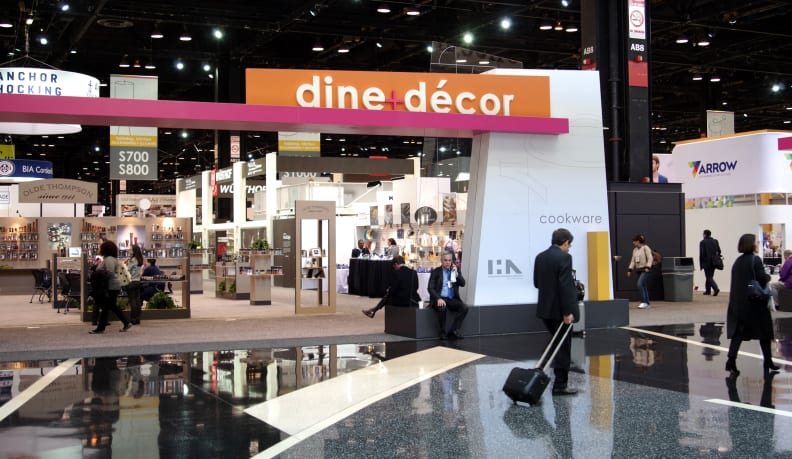
The show floor at the 2017 International Home and Housewares Show in Chicago, IL.
So I decided to get as close as I could. I hit the show floor and spoke with representatives from eleven different housewares companies that made at least some products in the U.S. I asked them why they continued to make here, and what prospects they saw for the future. I ended up talking with first-generation immigrants, fourth-generation family owners, circumspect PR folks, and outspoken CEOs.
I found their company histories and reasons for building products here to be as varied as the wares they sold. For some, patriotism was just as important as pragmatism. Others liked keeping quality control close to home, and some simply found that a “Made in U.S.A.” sticker made their products easier to sell.
Here are their stories.
Nordic Ware — St. Louis Park, MN
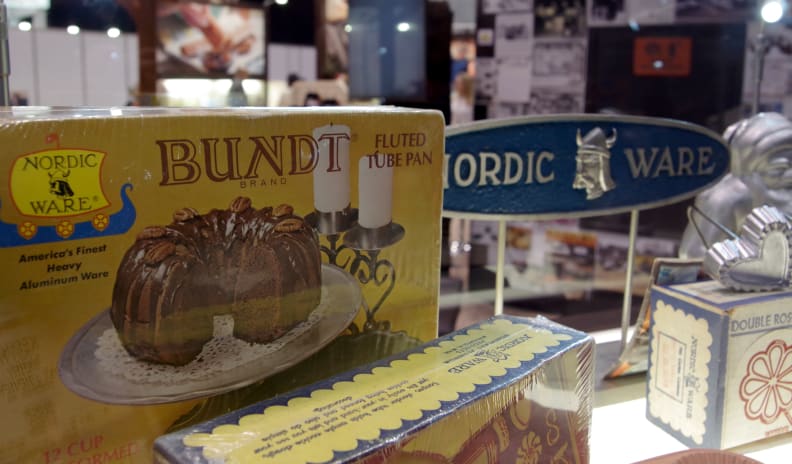
Original Bundt pans from the early days of Nordic Ware sit at the company's booth at the 2017 International Home and Housewares Show.
Population: 45,250 as of 2010 Median household income: $66,432 as of 2015 Best known restaurants: Blaze Fast-Fire’d Pizza, BlueFox Indian Bar and Grill
My first stop on the show floor was Nordic Ware. The company has been around for 71 years and is best known for inventing the Bundt pan.
In 2017, Nordic Ware still sells plenty of its famous cake pans. But, as is evidenced by its massive display at the entrance to the Housewares Show, a whole lot more products now wear the Nordic Ware badge alongside a “Made in USA” label.
The Nordic Ware booth was festooned with cake pans and baking supplies of all shapes and sizes, from Halloween-themed cookie stamps and dessert molds to Danish pancake pans and traditional cookie sheets. Nearly all of them featured a little American flag logo on the packaging.
David Dalquist is the second-generation family owner of Nordic Ware. His late father founded the company, and his 91-year-old mother is still involved in the business.
When I spoke with Dalquist, he credited the company’s success to the wide variety of products that surrounded him—all made possible thanks to local manufacturing.
“The one edge we have over the Asian imports is creativity,” he said. “We know what the American markets want.”
Unlike other people I spoke with, Dalquist wasn't afraid to talk politics. While he was quick to tell me that he didn't agree with Donald Trump on all issues, he said he was happy to see the Trump administration bring a new focus on creating manufacturing jobs.
After all, Nordic Ware employs 400 people in its Minneapolis-area factory, which Dalquist sees as evidence that America can still provide jobs in the manufacturing industry.
“It’s proof you can do it,” he said.
Key product: The original Bundt pan, $22.34 on Amazon.com
American Maid — Riverside, CA
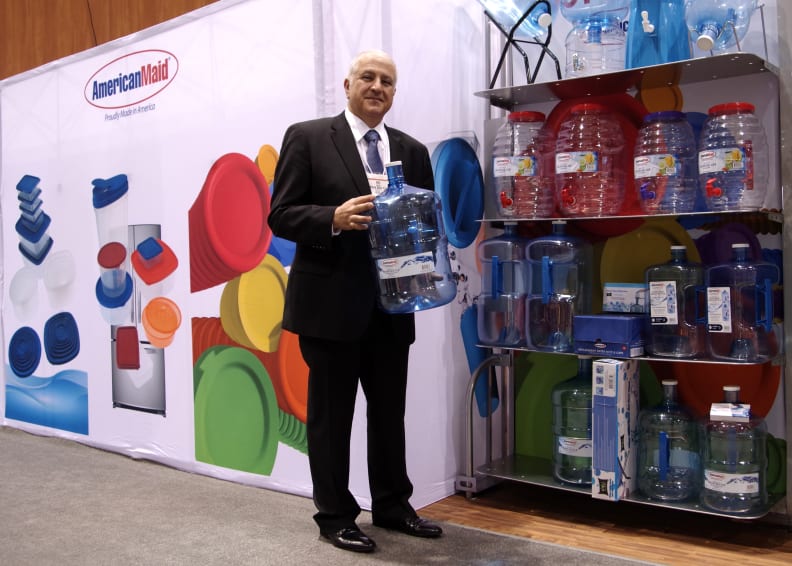
Moe Vazin of American Maid shows off his best-selling five gallon water jug.
Population: 303,871 as of 2010 Median household income: $57,196 as of 2015 Best known restaurant: Simple Simon’s, Anchos Southwest Grill & Bar
When investor Moe Vazin bought a struggling California plasticware company out of bankruptcy in 2003, he knew one thing: He was going to keep manufacturing in the U.S. So far, that strategy has worked out well.
“We’ve grown slowly and surely,” he said. Vazin runs the company along with his wife and a barebones sales and logistics staff—a strategy he said keeps prices low on the products he ships from his Riverside, CA plant, which employs 150 people.
He also gives Walmart a great deal of credit for its promise to put $250 billion of American-made products on store shelves by 2023—including some of the plasticware his company makes.
“They’ve been very, very positive with U.S. manufacturers,” he said. “They’ve been a blessing.”
Though the bulk of American Maid’s sales continue to be domestic, he’s starting to export more and more products to Central and South America, where buyers view the Made in U.S.A. label as a promise of quality.
“We have a higher standard,” Vazin said. “There’s no cutting corners.”
A mother shopping at Walmart Centroamerica in Guatemala, for instance, might buy an American Maid bottle for her family because she trust that a bottle made in the U.S. will truly be BPA-free.
For Vazin, the growing popularity of American Maid in other countries is proof that a promise of superior product engineering and stringent product safety regulations can resonate with consumers—just like goods from Germany and Switzerland command a premium in the U.S.
I can't help but feel that it's somewhat ironic, then, that one of American Maid's best-selling products in the U.S.—a large water jug—is designed for keeping drinking water on hand during emergencies, or when local water supplies fail.
Key Product: A 5 gallon water jug, $6.94 at Walmart
Aura Glass — Danbury, CT
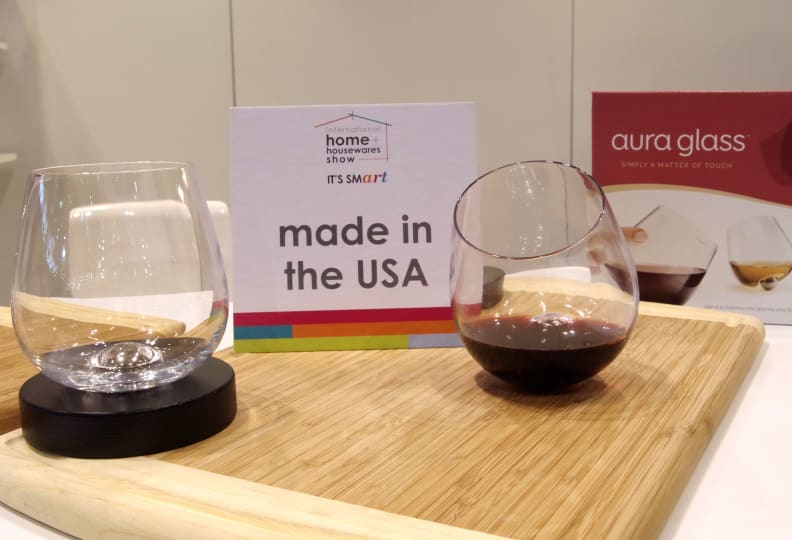
The Aura Glass first launched on Kickstarter.
Population: 80,893 as of 2010 Median household income: $66,676 as of 2015 Best known restaurants: Barbarie's Black Angus Grill, Stanziato’s Wood Fired Pizza
During the week, Ankana Carpenter and her husband Keven both work as engineers. But this weekend, she was at the Housewares Show in Chicago for the first time, showing off the spill-resistant glass the couple created.
The stemless Aura Glass, which first launched on Kickstarter, pivots on a stainless steel ball. The unique design makes it easier to aerate wine without spilling it, but added complications to the manufacturing process. That’s one reason why the Carpenters decided to partner with a U.S.-based glassmaker to bring their idea to life.
Born in India, Carpenter said that being “patriotic and loyal” was important to her—and you couldn’t beat the quality of American-made glassware. But for such a small company, it also made sense to mitigate risk by building close to home.
“It was important to keep that control close to us, and hand-hold the quality,” she said.
Aura’s small booth may have been dwarfed by those of better-known companies, but the husband-and-wife team behind the company aren’t unusual in the industry. In fact, 68.2 percent of housewares companies are small businesses with annual sales below $10 million.
While they still haven’t quit their day jobs, the Carpenters have hired an employee, signed a distribution agreement with a major retailer, and are beginning exports to Japan, Australia, Sweden, and New Zealand.
Key product: The Aura Glass, $49.95 for two
Epicurean — Duluth, MN
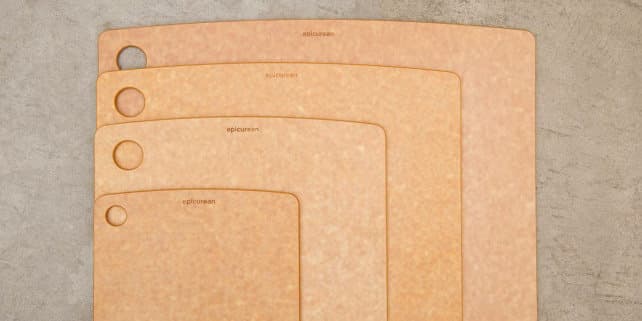
Epicurean cutting boards come in many sizes, shapes, and colors. These are in the original finish.
Population: 86,110 as of 2010 Median household income: $45,034 as of 2015 Best known restaurants: Northern Waters Smokehaus, Duluth Grill
Epicurean can be counted among the seven percent of housewares companies that manufacture solely in the U.S. (A further 32 percent make at least some of their products here.)
Fifteen years ago, however, Epicurean didn’t exist. Dave Benson owned a company that sold composite wood surfaces to skateboard parks. One year, he cut some leftover materials into cutting boards as gifts for friends and family.
They liked them so much that he started selling them to the public. Pretty soon, Benson made cutting boards his full-time job, and founded Epicurean. Today, he employs 65 people at a 60,000-sq.-ft. facility, building cutting boards that are beloved by foodies.
Manufacturing in Duluth was a natural progression for Benson. He grew up nearby and went to college in the city. His brother Greg even runs a nearby business building outdoor furniture from recycled plastic.
Familiarity aside, Benson quickly learned the benefits of building products in the U.S.
“We like the fact that we make everything ourselves,” he said, “We have control over the quality.”
Epicurean cutting boards start as raw material in Tacoma, WA. That gets shipped to Duluth and turned into a finished product. Even Epicurean’s packaging is made nearby.
Key Product: Epicurean non-slip cutting board, $26.90 on Amazon.com
World Kitchen — Mira Loma, CA; Charleroi, PA; and Corning, NY

Market Street dinnerware from Corelle, new colorful Pyrex bakeware, and Snapware reusable food storage are all made in the U.S. by World Kitchen.
Population (Corning): 11,183 as of 2010 Median household income (Corning): $51,022 as of 2015 Best known restaurant (Corning): Hand and Foot, The Cellar
You probably wouldn’t expect a company with a name like World Kitchen to have a robust manufacturing presence in the U.S. But some of World Kitchen’s brands—like Corning, Pyrex, and Snapware—make some of the most famous products to ever wear the Made in USA label.
One reason? “Making glass is not an easy process,” said Matt McDonell, World Kitchen’s director of brand marketing. That's especially true for break-resistant Corelle dishes and oven-safe Pyrex. In fact, high-end glass manufacturers tend to concentrate where there’s expertise—whether it’s in France, Eastern Europe, or the industrial cities between the Great Lakes and the Appalachian Mountains.
According to the IHA’s Reynolds, it’s not unusual for glass to be made domestically. “It’s heavy to ship,” he said. “It’s probably simpler to make it closer to the consumer.”
Unlike some of the startups and family-owned companies that manufacture in the U.S., World Kitchen’s brands are leaner versions of companies that once employed thousands. Today, World Kitchen has a total of 3,000 employees worldwide, including about 975 who work in U.S. factories—but the Pyrex factory alone once employed 2,100.
The same goes for World Kitchen’s American-made competitors Libbey and Anchor Hocking—the latter’s ups and downs famously chronicled in the best-selling book Glass House.
Indeed, many other World Kitchen brands with a history of U.S. manufacturing now rely on imported product—Revere Ware, for instance, hasn’t been made in the U.S. for over a decade.
But those brands that are still manufactured here embrace it, and play up their heritage. The designs on the Market Street New York line of dinnerware from Corning’s Corelle, for instance, are inspired by real locations in the company’s hometown of Corning, NY.
Key Product: Market Street New York dinnerware by Corelle, available at Macy’s
Igloo — Katy, TX

Attendees of the International Home and Housewares Show look at American-made coolers from Igloo
Population: 14,102 as of 2010 Median household income: $70,526 as of 2015 Best known restaurants: Joy Love Burgers, Da Vinci Ristorante Italiano
Igloo makes the vast majority of its hard-sided coolers—including the well-known Playmate—in a 1.5 million sq. ft. factory about 30 miles west of Houston, in Katy, TX. It employs over 1,200 people.
Igloo has been manufacturing its Playmate coolers in Katy for 45 years, but it also makes new products there—like the Trailmate beach cooler.
According to Candi Whitsel, Igloo's senior vice president of marketing and product management, manufacturing in the U.S. is good business for the company. “We’re shipping a lot of air,” she said, and paying to move empty boxes from Asia just doesn’t make sense.
The factory in Texas also offers time savings that outsourcing would not. “We can turn things around quickly,” she said.
Key Product: The Playmate cooler, $17.99 at Target
Hutzler — Canaan, CT

Hutzler's line of kitchen accessories is still made in the U.S.
Population: 1,212 as of 2010 Median household income: $48,438 as of 2015 Best known restaurants: Roma Pizzeria, Pops Diner
Lothar Hutzler came to the U.S. from Germany in the 1930s with experience making metalware. But wartime materials shortages led him to build items like cookie cutters, measuring spoons, and funnels out of plastic.
Today, although the company outsources some of its wares, many of its classic products are made in the U.S. In fact, I recognized a lot of the products at the Hutzler booth from my own grandmother’s kitchen—including a green nylon “Lopol” spatula that she bought in the 1960s, and that I still use today.
It makes sense that a company would continue making legacy products where it always did. But new products also wear a Made in USA label. For instance, the new cake decorating bags Hutzler debuted at this year’s Housewares Show are all made right in Canaan, CT.
Still, Hutzler isn't alone in having to outsource some products. According to the IHA's Reynolds, it's an issue for the entire housewares industry. "There are some we do a great job of making in the U.S., and a lot of things we don't have the capacity to make," he said.
Key Product: My grandma’s spatula, available at Bed, Bath & Beyond for $3.99
Vita-Craft — Shawnee, KS

Vita-Craft president Gary Martin shows off the company's new Tyler Florence cookware.
Population: 62,209 as of 2010 Median household income: $77,271 as of 2015 Best known restaurant: Big Bam’s Burgers, Oishi Sushi
Like the proverbial ‘80s rock band that can fill stadiums in Tokyo but not Toledo, Vita-Craft is big in Japan.
But unless you’ve encountered one of its door-to-door salespeople in the U.S., you’ve probably never heard of the Shawnee, Kansas-based manufacturer of premium stainless steel cookware.
Gary Martin wants to change that. He’s in the unique position of trying to grow domestic sales for a Japanese-owned, American cookware manufacturer that’s been based in Kansas since 1934 but remains largely unknown outside of Japan.
It comes as no surprise to him that Japanese consumers value Vita-Craft’s 5-ply cookware, made from surgical-grade stainless steel. Like German knives and French stoneware, American pots and pans are the pride of a serious cook. “They recognize the quality, and they recognize the value.”
Vita-Craft’s Japanese CEO Mamoru Imura apparently feels the same way. “He allows us to run the company, and he values the product being made here,” Martin said.
Martin hopes that expanded partnerships with retailers and a new line of cookware created in partnership with celebrity chef Tyler Florence will grow Vita-Craft’s presence in the U.S., which in turn will help him expand the cookware factory that currently employs between 30 and 50 people.
“The best thing is, I create jobs,” he said.
But in the end, what matters is quality. “I’m not going to say you should buy my product because it’s made in the U.S.A.,” Martin said. “I’m going to say I make a good quality product in Shawnee, KS.”
Key Product: New Tyler Florence cookware—coming soon to retailers
Libman — Arcola, IL
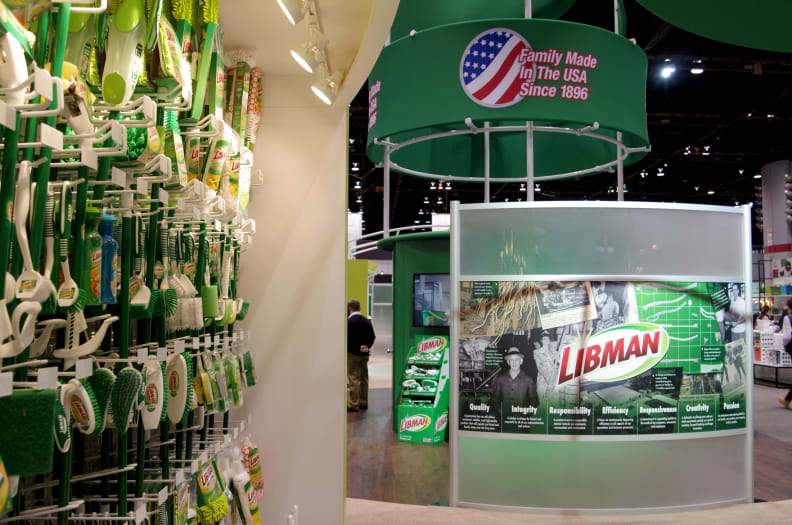
Libman's cleaning products are all made in Arcona, IL.
Population: 2,916 as of 2010 Median household income: $49,303 as of 2015 Best-known restaurants: El Taco Tako, The Dutch Kitchen
Arcola, IL is home to the world-famous Lawn Rangers, a drill team that marches with lawnmowers and brooms. In addition to appearing at the annual Arcola Broomcorn Festival, the Lawn Rangers marched in President Obama’s 2009 inaugural parade.
Even if you’ve never heard of Arcola, you’ve probably heard of Libman—or at least used some of the company’s green-and-white mops, brushes, and cleaning supplies, all of which are made in the U.S.
Libman is also the largest cleaning supply company in the world to be fully vertically integrated, meaning that everything from a dustpan's handle to the bristles on its brush are made in house.
“It helps us control quality,” said Eric Minor, Libman’s senior director of marketing. “If we’re making it, we know what goes into it.”
Libman employs about 500 people—a big deal in a town of just under 3,000. However, almost none of those employees work on an assembly line. “We’re fully automated. Robots everywhere,” Minor said. Former assembly line workers were reassigned rather than laid off—and that's good news for Arcola.
“We’re kind of a one-company town,” said Minor. “A lot of families depend on Libman.”
Key Product: The tornado mop, $18.79 at Amazon
Handi-Foil — Wheeling, IL
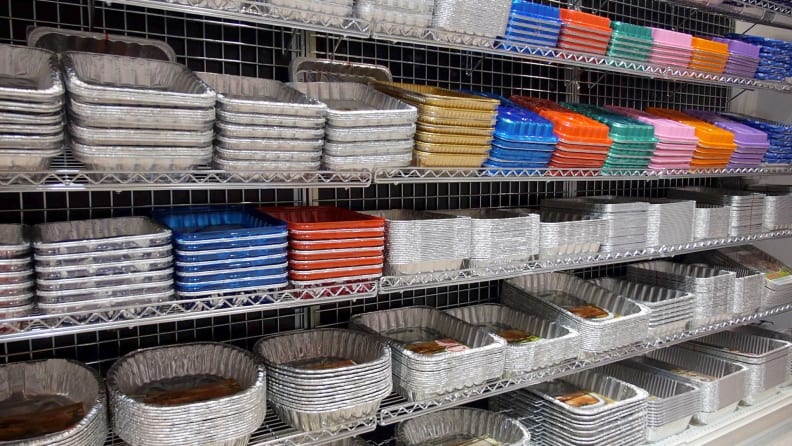
Handi-Foil's aluminum kitchenware on display at the 2017 International Home and Housewares Show.
Population: 37,648 as of 2010 Median household income: $56,110 as of 2015 Best-known restaurants: Bob Chinn's Crab House, Taqueria
Company president David Sarnoff seemed tight-lipped when I met up with him at the Handi-Foil booth. “We’re a private company,” he said—and he wasn’t just talking about corporate ownership structure. Despite making the roasting pans that are as much a part of American Thanksgiving dinners as cranberry sauce, it turns out that the family-owned business is pretty media shy.
Still, after conferring with the CEO—who is also his father—Sarnoff opened up a bit. Handi-Foil was founded in 1981, but David Sarnoff is the third generation of his family to make aluminum ware for the kitchen. His grandparents started a company that made drip pans for range burners, and his brother runs Handi-Foil’s food service division.
From colored finishes to new sizes, Sarnoff says a constant focus on new product is how Handi-Foil commands 73 percent market share. “We come out with new items every year,” he said.
The company has factories in Wheeling and Naperville, IL, and wouldn’t manufacture anywhere else. In fact, Sarnoff seemed insulted when I asked him if he kept production in the U.S. for a competitive advantage. “We want to make in the U.S!” he said. “We employ thousands of people. That’s our preference.”
Sarnoff didn’t spout off any buzzwords about sustainability, but he did seem pretty proud of Handi-Foil’s commitment to reducing waste—including a line of pans that are made from 100% recycled aluminum. Next year, he said, he might update the old-school booth to brag a little more.
“We wish more companies were like us,” he said.
Key Product: A recycled aluminum roaster pan, 98 cents at Walmart
Chef Specialties — Smethport, PA
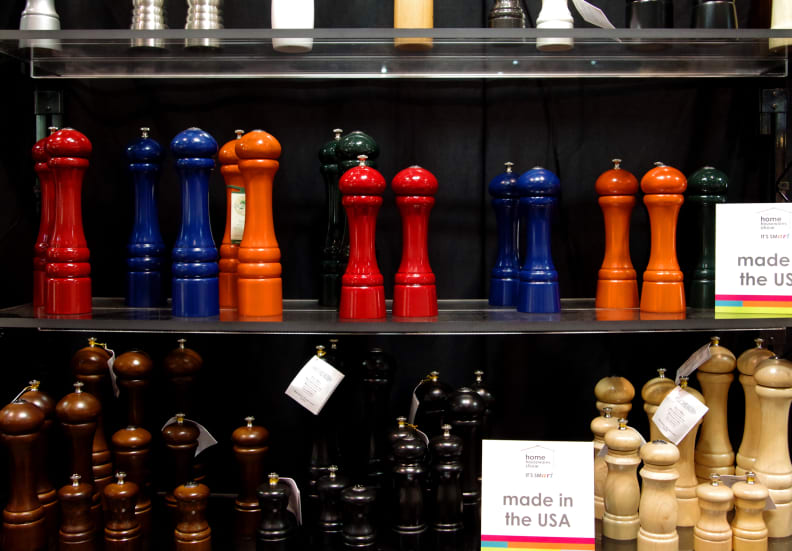
Pepper mills from Chef Specialties. They're made in the tiny town of Smethport, PA and compete against high-end models from Germany and France.
Population: 1,655 as of 2010 Median household income: $45,208 as of 2015 Best-known restaurants: Corner Bistro & Pizza, Smethport Drive In
Denise Frontino gave up trying to explain where to find Smethport, PA on a map, but she couldn’t say enough about Chef Specialties, the fourth-generation family-owned pepper mill manufacturer she’s worked at for 23 years.
“Almost any restaurant you walk into, you’d find our pepper mills,” she told me.
Chef Specialties’s mills are hand-built, come with a lifetime warranty, and have always been built in Smethport—which, for the record, is about halfway between State College and Buffalo. The company employs mostly women, many of whom have over 10 years of service with the company.
Other manufacturers I spoke with competed against low-cost imports from Asia. But upscale pepper mills tend to be made in France and Germany—countries with high labor costs and a reputation for quality work.
Still, Frontino told me that she’d put her company’s mills against any others in the world. “We have quality people who do a great job for us,” she said.
Key Product: Pepper mill and salt shaker gift set, $26.98 at Amazon
